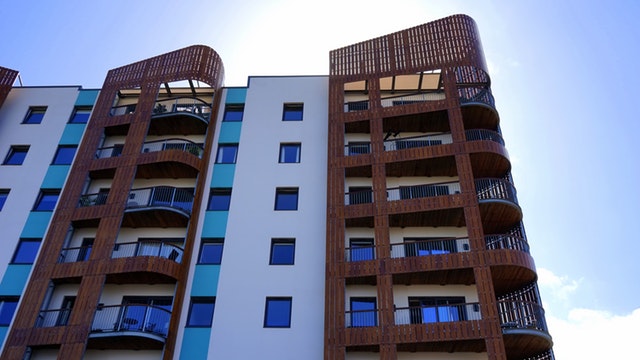Owning or if you are considering purchasing an apartment building (multifamily building) can be a high-maintenance undertaking that can be even more complicated without appropriate financing. You need to find the right lender to obtain a commercial loan to finance your apartment building. Unlike conventional mortgages, commercial loans vary in rates, terms, fees and overall structure. There are few things you need to consider.
Pros and cons of buying an apartment
The Pros
Depreciation- the value of apartments is assumed to depreciate over time. This assumption means that you will pay progressively lower tax on the property.
The Cons
Conditions and restrictions on commercial apartment loans
Qualification
To qualify for a loan a lender will have to analyze you. The lender will look for information on your experience as a property manager, collecting rent, if you have the ability to handle a project of such size, your income and also your credit score. The business tax returns along with a rent roll for the property will also be required.
- Your net operating income for the property. If it’s an apartment this will be the net rent collected from the apartment minus the expenses incurred on the apartment.
- Property value. Most lenders will give you a loan of up to 70% the value of the property. This is known as Loan-to-Value (LTV) ratio. It a measure of the loan amount relative to the value of your property.
- Loan servicing obligations along with your cash flow. How does your cash flow compare with your loan obligation.
Mixed use and or partially occupied properties
Conforming or portfolio

Types of commercial loans
- Long term fixed interest commercial loans- this loans require you to have a high credit sore of above 700. Their repayment terms is of between 5- 10 years. You must have been in business for an average of twelve months and above. Your apartment must also be half occupied by tenants. The interest rates fall between 4.75% and 6.75%
- Interest only payment loan– for this loan small payments are made for the bigger part of the term but a bigger balloon’ payment is made at the end of the term. This loans are good for you if you want to build up your business and expect a large payout at a later a time. The terms of this loan range between three to seven years.
- Hard money loans- hard money loans are urgent and come almost exclusively from private investors. They are given based on the value of your property itself and not your credit score. They however are short term and you will have to pay for them in less than two years most of the time. The interest fees are also very high ranging from ten and above and incur large upfront fees.
- Bridge loans – this is the softer version of hard loans with lower interest fees more lenient terms. But for this loan your credit score will be required to be of a min-mum of 650.
5. Blanket loans – these loans cover up multiple properties so you don’t have to deal with multiple lenders. You however will most likely pay large interests and possible heavy default fees.
Loan terms
There three types of terms of loans
- A long-term loan – this loan runs for three to twenty five years. It requires monthly or quarterly repayments. This loan affects the long term financial running of the company such as other loans the payment of staff. They may also require that you set a side part of the profit towards servicing of the loan. This loan will use your companies property as collateral.
- A short term loan– it is offered for a term of not more than one year. It is mostly offered to small corporations that can’t qualify for a line of credit.
- Intermediate term loan– you will acquire this loan for a term period of between one to three years. It’s is paid in monthly installments from your corporations cash flow
Fees
You will have to pay for origination fee for you to acquire a loan for your apartment among other expenses such as flood insurance in case your apartment is located in the government flood marked zones.
Ownership
The ownership of property can either be individual or limited liability corporation(LLC). It is highly advisable that your register your property ownership as an LLC rather than individual. This will prevent the liabilities of your other properties from spilling into your property that is registered as an LLC property. LLC as the name indicates has limited liabilities for example if one of your properties or yourself is facing bankruptcy it will not spill into your apartments.
Prepayment penalties
At times you may want to clear your loan before the maturity date. Lenders will treat this situation differently so it is important that you note the conditions when applying. Some lenders even have restrictions on prepayment so as to preserve the lenders yield on the loan. But in most scenarios a prepayment penalty is applied.
There are four kind of prepayment penalties.
- Lockout- you are not allowed to repay your loan before the agreed time of loan maturity has elapsed.
2. Interest Guarantee- the lender will be entitled to a specific amount of interest even if the loan is paid early. This means that the lender is able to recover all the interest that was to be received from the loan. - Prepayment penalty- the outstanding balance is calculated and multiplied by a certain prepayment penalty fee.
- Defeasance- instead of paying cash to the lender you pay off inform of a collateral equal to the original loan collateral. However this method can have high penalties attached to it.
Assumption
Loan repayment can be assumed by a new borrower and avoid prepayment penalties. Not all loans are assumable though so inquire from your lender before taking the loan.
Recourse and non-recourse
In the case you default on your loan repayment your lender should be able to hold your loan guarantor responsible. In this case this loan will be known as a recourse loan. At times the lender may not require a guarantor for your loan mainly because your corporation is new. The only guarantee on the loan that the lender has is your apartment, in case you default your apartment will be auctioned. This kind of loan is known as a non- recourse loan indicating that the lender has no recourse on you or anyone in case of defaulting.
Documentation needed for financing
For you to a loan most lenders will require the following
- Pictures of the apartment
- Map showing the location
- Income tax returns
- How the property compare to other nearby properties.
- The bank statements
- Documentation of collateral
- Rents now and in the coming future
To find out more about our multifamily and apartment building loan programs, or to discuss any commercial apartment loan scenario for that matter, call us directly at 866-647-1650 or fill out the contact form on the “Contact us” page.







